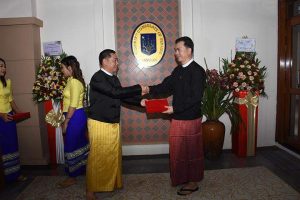Since the military coup that overthrew Myanmar’s elected civilian government in February, much press attention has been given to Russia’s substantial arms sales to the country’s armed forces, also known as the Tatmadaw. Certainly, the Russian government has done little to conceal its interest in profiting off the country’s tumults.
On March 27, Russia’s Deputy Defense Minister Alexander Fomin attended a military parade and banquet in the capital Naypyidaw to mark Armed Forces Day, pledging to deepen military relations with Myanmar on the same day that some 120 civilians were shot dead by security forces for resisting the coup.
But as the advocacy group Justice for Myanmar (JFM) shows in a new report, Russia’s western neighbor Ukraine has also played a less heralded role in keeping Myanmar’s military supplied with arms and other crucial components.
The JFM report, which is based on Ukrainian export records and other leaked documents from the Myanmar government, claims that Ukrainian firms, some state-owned, have sent numerous shipments of aircraft, ship, and tank parts to Myanmar since 2015. Indeed, some have done so since this year’s coup, despite Kiev voting in favor of a U.N. General Assembly resolution calling for a halt to the flow of arms to Myanmar.
Among the most recent deals were two shipments from Motor Sich, a major Ukrainian manufacturer of engines for aircraft and missiles. The first of these, which took place in February, contained mechanical parts that were sent to the Yangon based private air force supplier Sky Aviator. The second – a shipment of turbojet engine parts – went to the army’s directorate of procurement on May 31, at the same time, the report notes, as the Myanmar air force “increased indiscriminate airstrikes in ethnic areas.”
That same month, the state-owned arms manufacturer Ukroboronservice shipped around 164 kilograms of aircraft parts to Yatanarpon Aviation Services, a firm headed by the son of a former forestry minister. This followed shipments to Yatanarpon of navigational devices and control instruments in December 2020.
These transfers from Ukrainian firms, the report argues, “are only the most recent examples of significant arms links that amount to aiding and abetting the atrocity crimes of the Myanmar military.” Indeed, the Kiev-Naypyidaw arms pipeline began to operate under the former National League for Democracy (NLD) government.
In 2018, Myanmar and Ukraine signed an agreement on military-technical cooperation that came into force in June 2019. The agreement contained seven points for military cooperation, “including research and development of arms, production of conventional weapons, the supply of arms and related equipment, and joint sales and marketing of arms in third countries.” Among the main Ukrainian arms exports to Myanmar are air surveillance radar systems, armored personnel carriers, aircraft engines, and MMT-40 light tanks.
Among the most significant deals highlighted by JFM is an agreement, possibly signed in 2019 or 2020, to set up a plant in Myanmar that would produce BTR-4 armored personnel carriers, MMT-40 tanks, and 2SIU self-propelled howitzers both for domestic use and export.
The factory is a joint partnership between the Myanmar military’s Directorate of Defense Industry, Ukrainian state-owned arms conglomerate, Ukroboronprom, the state arms trade company, Ukrspecexport, and Myanmar Chemical & Machinery (MCM), a private Myanmar arms broker. If completed, the project would provide “an alarming boost to the Myanmar military’s arms manufacturing capabilities” and contribute to “war crimes and crimes against humanity.”
Many of these arms deals have been facilitated via business relationships between Ukrainian arms companies and private Myanmar firms closely connected to the Tatmadaw. One such case is the aforementioned MCM, a firm headed by one Aung Hlaing Oo, who was so valued as an arms trading go-between that he was appointed as Ukraine’s honorary consul to Myanmar in January 2017. The JFM report cites a private sector source with military connections, who claimed that Aung Hlaing Oo receives commissions of 20-30 percent on arms sales from Ukraine, “which amount to substantial profits for his businesses and the Ukrainian state.”
Other middle-men include Myanmar Avia Services (formerly Myanmar Avia Export), a company owned by the well-connected crony tycoon Tay Za, and the blandly named Myanmar Consultancy Company, headed by the arms dealer Naing Htut Aung, who is also allegedly involved in procurements from major state-owned Chinese arms producers.
While Ukraine’s arms trade with Myanmar is more modest than that of Russia and China, Myanmar’s two leading sources for weapons and military equipment, JFM argues that the flow of arms is not only fortifying the military in its battle against the anti-coup resistance; it also helped abet its actions during the NLD administration in 2017, when it carried out savage assaults on the Muslim Rohingya communities that United Nations experts have equated to genocide.
“Ukraine is enabling and profiting from atrocity crimes in Myanmar through its deep ties to the Myanmar military, flouting international law,” JFM spokesperson Yadanar Maung said in a press release accompanying the report’s release.
As Myanmar’s crisis grinds on, potentially entering into more intense fighting in the weeks and months to come, it is unclear whether Ukraine has a binding international legal obligation to cease its deals with the Myanmar military. But it certainly has a moral one.

































